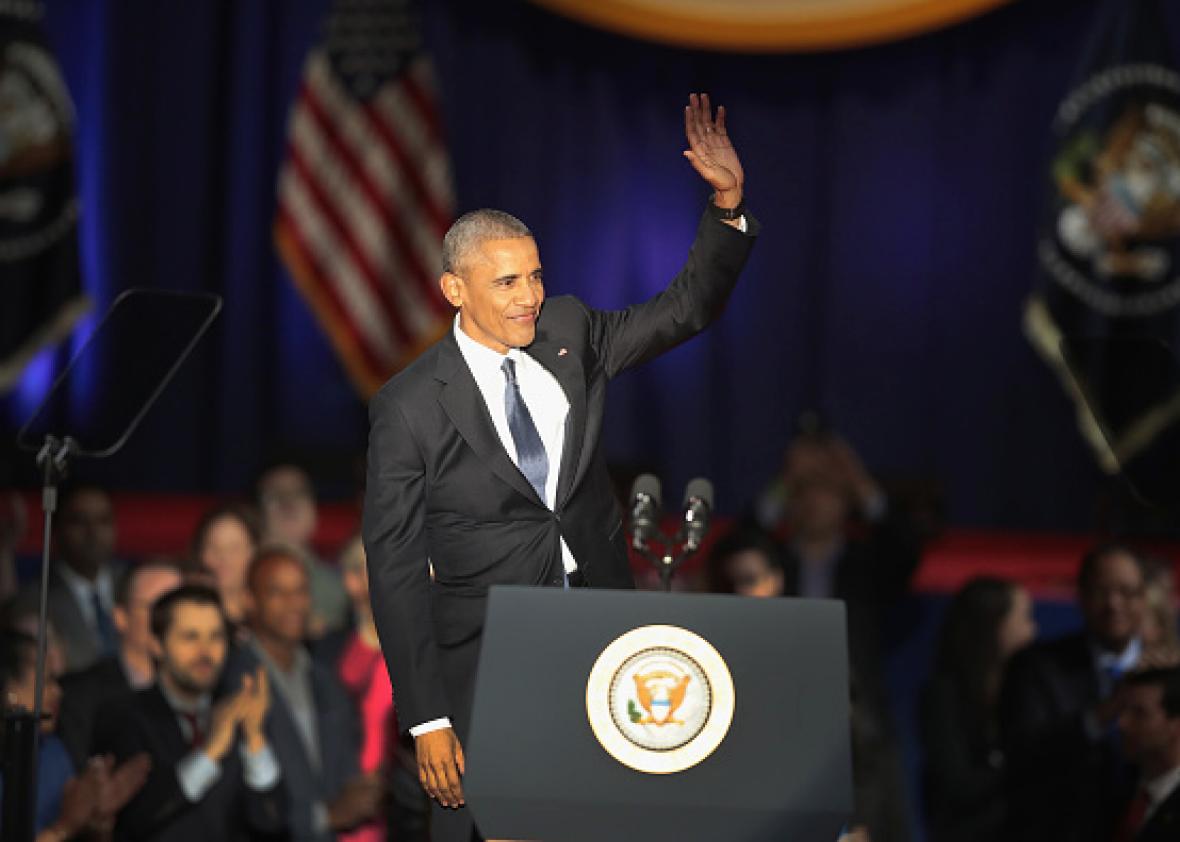Barack Obama offered a message of hope and empathy to a gathering of supporters in Chicago during an hourlong farewell address that served as a valedictory for the outgoing president and also an expression of what he says he believes is still possible for this country.
Obama opened the speech by touting his administration’s achievements in combating terrorism, and climate change, and lowering the uninsured rate, and improving the economy from its darkest moments of the financial crisis of 2008 and 2009.
But mainly, he spoke in typically broad themes of reaching across party lines to face common challenges, rhetoric he has embraced from the time that he gave his breakout “red America, blue America” speech at the 2004 Democratic National Convention, through his 2008 campaign for president, until his final year in office.
“We remain the wealthiest, most powerful, and most respected nation on Earth,” Obama said. “Our youth and drive, our diversity and openness, our boundless capacity for risk and reinvention mean that the future should be ours.”
This optimism was offered despite the election of Donald Trump, a successor with no government experience who made his political bones questioning Obama’s very legitimacy as an American citizen and legal president in appeals to the basest racist instincts in American society.
He also attempted to use the speech as a political call to arms to his supporters to become more active in civic life, even in non–presidential election years:
If you’re tired of arguing with strangers on the internet, try to talk with one in real life. If something needs fixing, lace up your shoes and do some organizing. If you’re disappointed by your elected officials, grab a clipboard, get some signatures, and run for office yourself. Show up. Dive in. Persevere. Sometimes you’ll win. Sometimes you’ll lose.
But that message of optimism felt at times lethargic, almost forced.
“For those of us fortunate enough to have been a part of this work, to see it up close, let me tell you, it can energize and inspire. And more often than not, your faith in America—and in Americans—will be confirmed,” he said.
“Mine sure has been,” he then read in one of the least convincing deliveries of an Obama speech that I can recall hearing.
The New Yorker’s David Remnick reported in November how Obama has been putting on a brave face since the election, both out of a desire to ensure that our democratic institutions are respected and out of “the civic duty he felt to prevent despair not only among the young people in the West Wing but also among countless Americans across the country.”
This speech felt like Obama doing that duty one more time before riding off into the sunset even as his attempts at unifying the country were ultimately stymied at every turn by a political opposition determined to delegitimize his every act as president.
The speech itself implicitly recognized the scariness of the world that Trump will take over—and conversely the one Obama leaves office to—with the president framing the address as advice for how Americans can preserve our fractured democracy. He seemed to acknowledge that the forces of reason, and pragmatism, and hope, and decency are actually on the wane and that the forces of achieving power for the sake of power are on the rise. He even offered an oblique reference to Russian President Vladimir Putin’s apparent (and apparently successful) efforts to influence the outcome of our democratic election to the benefit of Trump:
It’s that spirit [of innovation]—a faith in reason, and enterprise, and the primacy of right over might, that allowed us to resist the lure of fascism and tyranny during the Great Depression, and build a post–World War II order with other democracies, an order based not just on military power or national affiliations but on principles—the rule of law, human rights, freedoms of religion, and speech, and assembly, and an independent press. That order is now being challenged—first by violent fanatics who claim to speak for Islam; more recently by autocrats in foreign capitals who see free markets, and open democracies, and civil society itself as a threat to their power. The peril each poses to our democracy is more far-reaching than a car bomb or a missile. They represent the fear of change; the fear of people who look or speak or pray differently; a contempt for the rule of law that holds leaders accountable; an intolerance of dissent and free thought; a belief that the sword or the gun or the bomb or propaganda machine is the ultimate arbiter of what’s true and what’s right.
Still, Obama attempted to close on a note of optimism.
“This generation coming up—unselfish, altruistic, creative, patriotic—I’ve seen you in every corner of the country,” he said. “You believe in a fair, just, inclusive America; you know that constant change has been America’s hallmark, something not to fear but to embrace, and you are willing to carry this hard work of democracy forward. You’ll soon outnumber any of us, and I believe as a result that the future is in good hands.”
With Donald Trump set to take office in a matter of 10 days, however, that future seems to many of us further off than it has been in a very long time.
